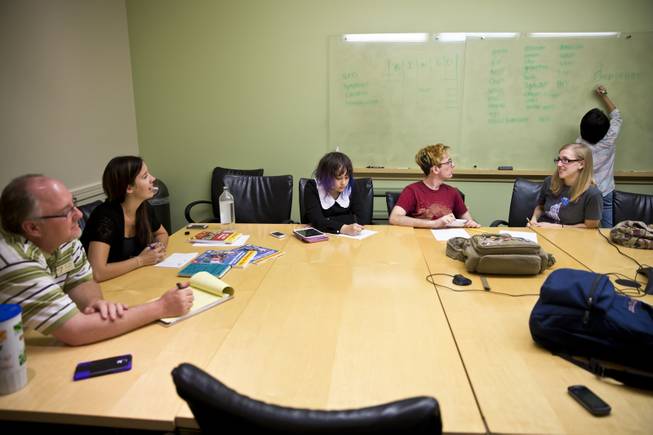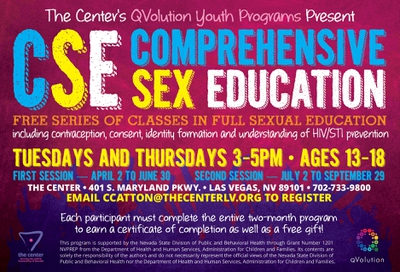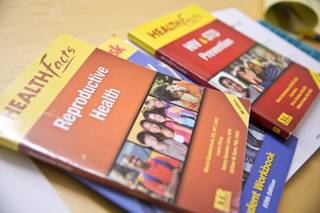
CCSD students attend a sex education class Tuesday, May 19, 2015, at the Gay and Lesbian Community Center.
Thursday, May 21, 2015 | 2 a.m.
When 17-year-old Armando Amaya last took sex ed during his sophomore year at Clark High School, it didn’t make much of an impact.
“Most of my friends don’t really care,” he said. “I left not knowing anything.”
Now he spends each Tuesday and Thursday after school attending free comprehensive sex ed classes offered by the Gay and Lesbian Community Center. The organization decided to offer the classes because they feel the Clark County School District’s abstinence-based sex ed doesn’t do a good job at educating the valley’s teenagers.
A contingent of current and former CCSD students have come forward in recent months criticizing the district’s current sex ed policies. They say teachers often skim over important topics, refuse to answer questions and sometimes provide inaccurate information.
The district is technically in the process of reexamining its sex education curriculum, but progress has been slow going for months. The results of a recent survey found that a majority of parents disapproved of schools teaching topics that are often included in comprehensive programs, like gender identity, homosexuality and where to obtain contraception.
Amaya and a handful of students gather in a conference room at the center. There they discuss everything from sex to drugs to gender identity.
“I leave these classes a lot more knowledgeable,” Amaya said.
The classes, available to students ages 13 through 18 with parental permission, touch on topics that are often taboo for many teachers and parents.
But not to Dr. Guy Cooper, a former drug addict who came of age as a gay man during the early years of the HIV scare. Now he’s a counselor and professor of human sexuality at the College of Southern Nevada. He co-teaches the class with Brittany Freer, a special education teacher.
Cooper and Freer have experienced firsthand many of the things their students are struggling with. They don’t change the subject when the students talk openly about their sex lives or how often they take drugs.
“We want them to be able to ask us anything,” Cooper said. “I’m not here to save their soul, I’m here to save their life.”
Cooper said parents have no idea how early and often kids are being exposed to sex and drugs. During a lighthearted game of STD bingo, one student talked about getting blackout drunk at several parties and waking up not knowing what happened.
After Cooper and Freer made sure the student had not been sexually assaulted, they discussed date rape drugs and their effects on the body.
“I want them to come in and feel like they’re talking to a friend,” Cooper said.
Cooper, previously a health official in Mexico who said he was kicked out of schools for teaching kids about condoms, feels that teaching comprehensive sex education is crucial.
“If you can’t say the word ‘condom’ in sex ed, how are you going to protect your kids?” Cooper said, calling abstinence-only education a “death sentence.”
He and Cameron Catton, a youth coordinator at the center, have watched in horror as angry parents attempted to squash a recent effort by CCSD to reexamine its sex education curriculum.
“It’s not a personal issue, it’s an education issue,” Catton said. “They end up being 17, 18 and 19 years old and having no idea about reproductive systems.”
The center was able to offer the classes this year because of a federal health grant, but that won’t last forever.
The first session of the class goes until June 30. The last session runs from July 2 to Sept. 29.



Join the Discussion:
Check this out for a full explanation of our conversion to the LiveFyre commenting system and instructions on how to sign up for an account.
Full comments policy